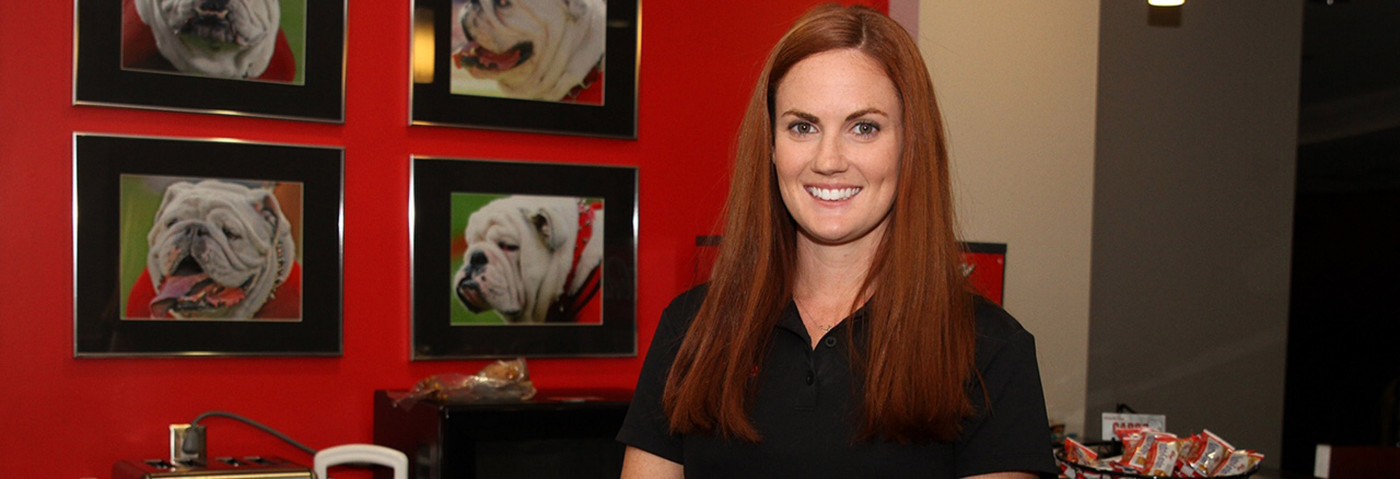
Maria Breen Williams
Williams earned her BS and MS/DI from our department and is a sports dietitian for the UGA Athletic Association. There was no sports nutrition program at UGA when Maria Breen Williams began her undergraduate career several years ago.
There was no sports nutrition program at UGA when Maria Breen Williams began her undergraduate career several years ago. After receiving her MS degree under the direction of Dr. Rick Lewis in the Bone and Body Composition Lab, she is now a key member of a team that oversees the nutrition needs of more than 700 UGA student-athletes. Maria writes menus, stocks “fueling stations” and counsels athletes and entire teams on proper nutrition. Below, she answers a few questions about her job.
- Your job is multi-layered, from education in team settings to one-on-one counseling to actually ordering food and writing menus. What aspect of your job is the most rewarding?
It’s great to impact a student athlete so that they make it a little farther in their goals and maybe do better in a competition than they would’ve done otherwise, but when you see a kid come in who doesn’t know how to eat healthfully at all and now for four years they have had this resource where they’re constantly getting educated and counseled to the point that they know what it means to eat healthy and be healthy for the rest of their lives is really gratifying.
- Considering that few athletic departments, including UGA, even had a sports nutrition department just a few years ago, to what do you attribute the increased emphasis on it now?
One of the things we’ve always said is it’s a culture shift. Many student-athletes weren’t thinking about how they should eat for performance or they weren’t doing it right. Fast forward a few years and every athlete knows who their sports nutritionist is. These nutritionists are meeting with them, they’re providing them meals and tips to support their training, there are constant messages going out on social media, reminders through email and so on. Our staff held over 700 student-athlete appointments and delivered almost 90 team educations last year alone. It’s in the culture of our Athletic Association now that sports nutrition is an integral part.
- Why is sports nutrition so important?
In Georgia there are a lot of people of people coming in at risk of diabetes, of obesity of hypertension, of all these chronic diseases, if you’re not taught how to eat as an athlete and you’re just told you’ve got to gain weight so eat all this food, you’re likely contributing to some of the comorbidities they may develop later in life. We’re that area of impact and change.
- What are some common nutrition-related issues you see with incoming athletes?
There are so many people who come in who don’t know the very basics of nutrition: what a carbohydrate is and what it does for you, for example. Most student-athletes coming in don’t know that, or even how food impacts their health.
- What is a typical team education talk like?
We set a goal of three team educations for each phase of their training cycle, so in-season or off-season, and this is stuff the whole team is working on together. An example of a topic is hydration. We would cover: why it is important, how much fluid they need to consume and provide easy solutions to how our student-athletes can get it done. And (beyond that) we offer individual counseling that is specific to you as an individual and that’s where the real dietitian work occurs, where we’re fully assessing an individual.
- Can you summarize the UGA sports nutrition program’s philosophy in regards to the education component of your job?
Our philosophy is prevent, protect, perform. Breaking that down, the prevent can encompass so many things: fatigue, injury, food insecurity. Protect could be protecting against supplements, which can be high-risk to both an athletes’ health and their eligibility, or protecting against chronic diseases later in life; and the perform is definitely sports-focused, as in, what we can do to intervene to make them better in what they do.
- People might not realize that you actually write menus for all the teams you oversee. How does that work?
Take swimming, for example. If they’re on the road and staying in a hotel and their pre-meet meal is going to be in the hotel, I’m the one who writes all the menus for all their pre-meet meals because you can never know what the hotel is going to do and you can ask them to do anything – so I do! I write down exactly what they’re going to be eating the night before and the morning of. In addition to meals surrounding competition, our staff writes a four-week menu cycle for all of lunch and dinner training table meals and all the menus for the grab and go stations as well.
- So it’s safe to say you’re a big Bulldog fan as well?
You’re invested. Once you’re working with a team and program you’re invested in their success. If they win a national title, you know you had a part in them getting there.
